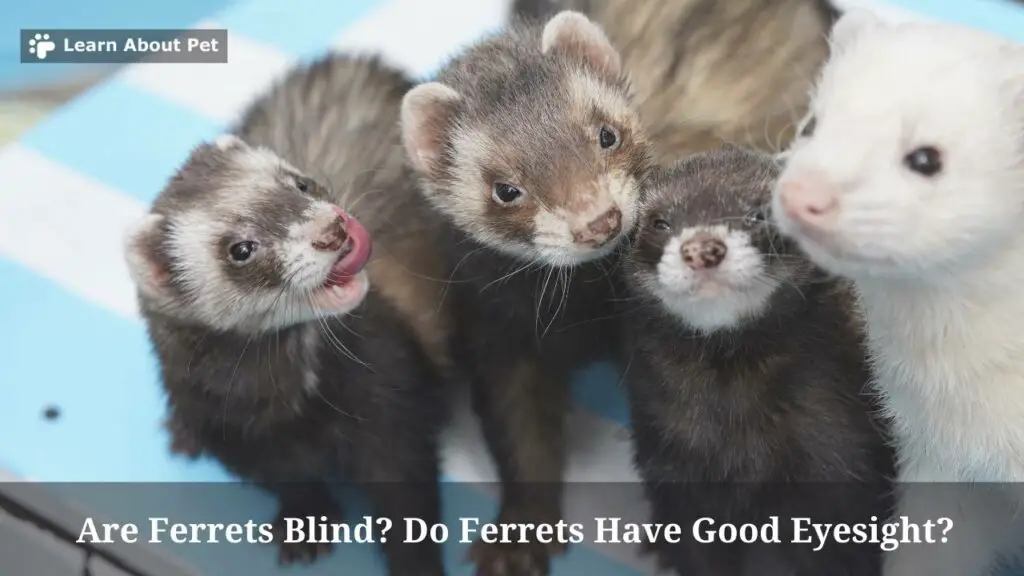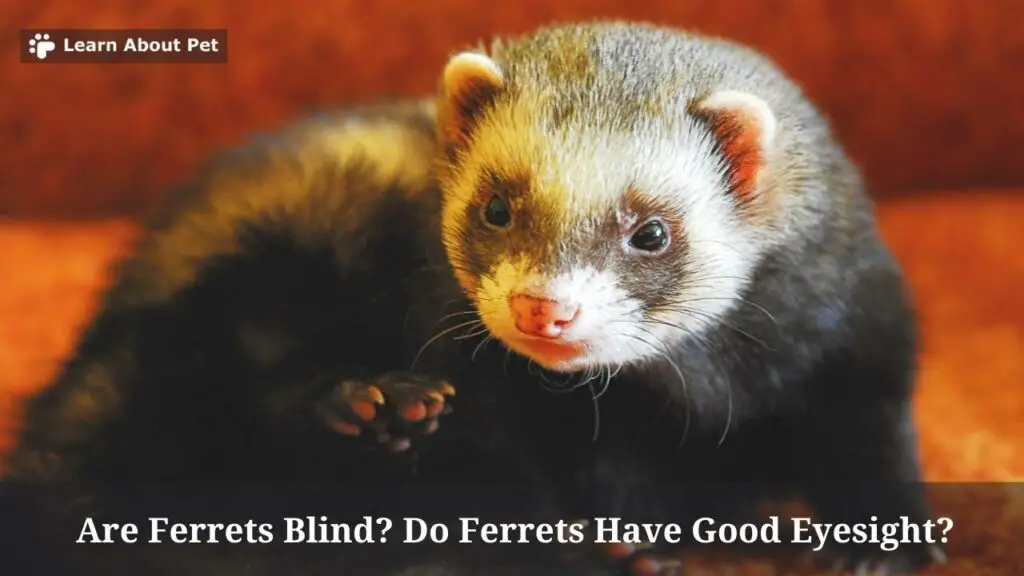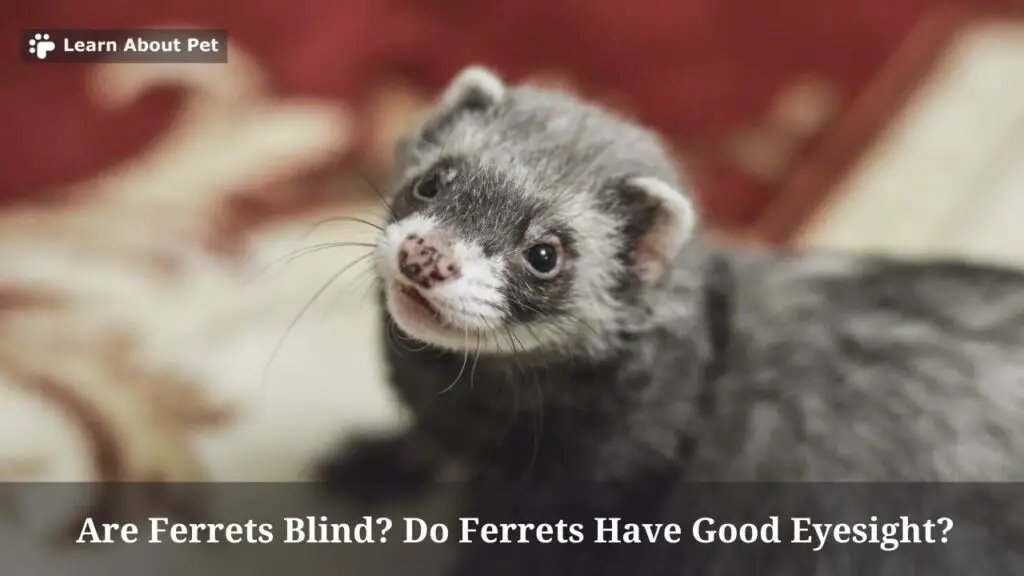People who are considering acquiring pet ferrets often express interest in getting information about the ferrets’ eyesight. They specifically endeavor to know whether ferrets are blind. There are also those who desire to know whether ferrets are blind out of pure curiosity. This article addresses that subject.
Are ferrets blind? Knowing whether ferrets are blind can be helpful in making the decision on if or not to adopt them as pets.
For people who already own ferrets, getting knowledge about their eyesight can help in working out how best to take care of them.

Do Ferrets Have Good Eyesight?
Ferret eyesight is generally poor.
In relative terms (compared to other animals of similar size), we would term ferrets eyesight as being ‘below average’.
Indeed, if you were to research on what does a ferrets eyesight look like, that is mostly what you’d learn. It is poor, below-average eyesight.
Ferrets do have some ability to see (otherwise how do ferrets see humans)? But that ability to see which ferrets have is not very good.
Nobody can ever say that they have encountered a ferret with what can really be termed as ‘excellent eyesight’…
Some of the ferret eye problems are attributable to the anatomy of ferret eyes. In that regard, we find that the eyes’ lateral location creates some sort of blind spot.
Moreover, the ferrets have a nearsightedness problem. On account of this, they often struggle when it comes to seeing things that are right in front of them.
It is in fact precisely this inability to see things that are right in front of them that implies blindness. They sometimes also don’t always seem to respond well to sound stimuli.
Consequently, you find people asking questions like, are ferrets blind or deaf?
So the truth of the matter, at least with regard to eyesight, is that ferrets generally don’t have good sight.
That is in fact why there seems to be so many tutorials and other resources on how to care for ferrets with bad eyesight. It is because the problem of poor sightedness is quite common in ferrets.
Are Ferrets Blind?
So far, we have said that ferrets’ eyesight is generally not good. This leads to a question on whether they are actually blind. Having poor eyesight and actually being blind are two different things: hence this question.
Are ferrets blind? The answer is ‘no’. Whereas ferrets generally have poor eyesight, most of them nonetheless have some ability to see. However, there are a few ferrets that are born blind, and quite a number that go blind later in life.
Is blindness common in ferrets? One would say that rates of blindness in ferrets seem to be higher than rates of blindness in other animals. But are all ferrets blind? The answer is ‘no’ – as most have some basic ability to see.
Are White Ferrets Blind?
Most white ferrets possess some capability to see. So we wouldn’t term them as being blind.
Sure, like all other ferrets, the white ferrets’ eyesight is not excellent. But they do usually have some ability to see.
Then again, a few white ferrets are born blind. And we also have those white ferrets that become blind as their lives progress. So they are born with sight. Then they become blind later.
Are Albino Ferrets Blind?
Albino ferrets tend to have higher susceptibility to eyesight problems than other types of ferrets. However, most of them have some basic ability to see. So they can’t be termed as being fully blind.
A few albino ferrets may be born blind. But most are born with some ability to see – though their eyesight may be problematic.
Quite a number of albino ferrets go on to become totally or substantially blind in the course of their lives. That is in spite of having been born with sight.
But there are also those that live out their entire lifespans without turning fully blind.
Are Ferrets Color Blind?
For the most part, ferrets don’t perceive colors in exactly the same manner as we (humans). They may not be fully color blind, but they just perceive color differently.
The type of life that ferrets live in their natural (underground burrow) habitats invalidates the need to perceive colors intensely. Those are usually dark habitats, in which it would be hard to tell one color from another anyway.
The ferrets rely more on their senses of smell, touch and hearing, rather than the ability to perceive colors intensely.

Can Ferrets Go Blind?
Ferrets are capable of going blind.
It is possible for a ferret that was born with the ability to see to lose it at some point.
While answering the question on whether ferrets are blind earlier, we said that most of them have some eyesight: albeit poor eyesight.
Sometimes though, the ferret eyesight deteriorates to a point where a particular ferret becomes pretty much blind.
So ferrets that were born with sight can eventually go blind.
How Do Ferrets Go Blind?
There are several ways in which ferrets go blind.
In some cases, ferrets may go blind due to untreated eye infections. Conditions like glaucoma in ferrets and uveitis in ferrets can eventually cause blindness.
In other cases, ferrets may go blind due to cataracts. Indeed, if proper ferret cataract treatment isn’t initiated, blindness is quite often the ultimate outcome.
Thus eye infections, and the subsequent lack of timely ferret eye infection treatment, can ultimately cause blindness in ferrets.
There are other cases in which ferrets go blind due to eye trauma. For instance, when ferrets start to fight, they sometimes end up injuring each other’s eyes. This sometimes is so bad that it leads to blindness.
What Are The Signs Of Blindness In Ferrets?
A ferret that is blind may have the tendency to keep on stumbling against objects it would otherwise be expected to see. Big, hard-to-miss objects.
It is also common to find a white layer covering the eyes of the ferrets that are blind (or going blind). This white layer is indicative of the presence of cataracts: a common cause of ferret blindness.
Is Ferret Blindness Curable?
Some types of ferret blindness may be preventable, but once the ferret really becomes blind, it is usually impossible to reverse the condition.
Nonetheless, if you have a ferret that seems to be blind, it is worth taking it to a vet. Sometimes, what is causing the ferret blindness (like cataracts) may be somewhat removable, thus restoring the animal’s sight to some extent.
In terms of preventing ferret blindness, it can help a great deal to maintain high standards of hygiene in the ferret cage. This way, you can keep away pathogens that could cause ferret blindness.
It also helps to be inspecting the ferret’s eyes regularly. If you see signs of infection (such as discharges or redness) take the ferret to a vet urgently.
Remember, as we said, timely ferret eye infection treatment may help in saving the ferret’s eyesight.
Final Verdict – Are Ferrets Blind
Most ferrets have some ability to see. Therefore we can’t term them as being entirely blind. But the ferrets’ eyesight for sure tends to be poor. And some ferrets do become blind later in the course of their lives.
The commonest eye problem in ferrets is that of nearsightedness. On account of this, the ferrets are often able to see far away items, while missing objects right in front of them!
The nearsightedness that is common in ferrets is often mistaken for total blindness. Closer examination however reveals that the ferrets are not totally blind: just poor-sighted, specifically with a nearsightedness issue.
It is possible for ferrets that were born with some eyesight to lose it with time though. Thus ferrets that were born sighted may eventually become blind.

In ferrets that become blind later in their lives, the commonest causes are things like untreated eye infections and physical trauma.
You may lower the chances of your ferrets becoming blind by maintaining high standards of hygiene in their cages.
Checking the ferrets’ eyes regularly, and having any budding eye infections treated urgently, can also go a long way in trying to preserve ferrets’ eyesight.
As a pet lover, make sure to learn about pet more and give your pet ferret a good and comfortable life!

Welcome to Learn About Pet. My name is Rajkumar Ravichandran and I love all pets, travel, and amazing food. I write about my passion and personal experience caring for multiple pets in this blog! ❤️
Post Disclaimer
DISCLAIMER: THIS BLOG OR WEBSITE, "Learn About Pet", DOES NOT PROVIDE YOU WITH MEDICAL ADVICE AND IS NOT A SUBSTITUTE FOR MEDICAL ADVICE. ALWAYS GET IN TOUCH WITH YOUR PERSONAL VETERINARIAN AND USE INFORMATION HERE AS GENERAL ADVICE.
The information, including but not limited to, text, graphics, images and other material contained on this website are for informational purposes only. No material on this site is intended to be a substitute for professional veterinary advice, food recommendation, diagnosis, or treatment. Always seek the advice of your veterinarian or other qualified health care provider with any questions you may have regarding a medical condition or for pet food related questions.







